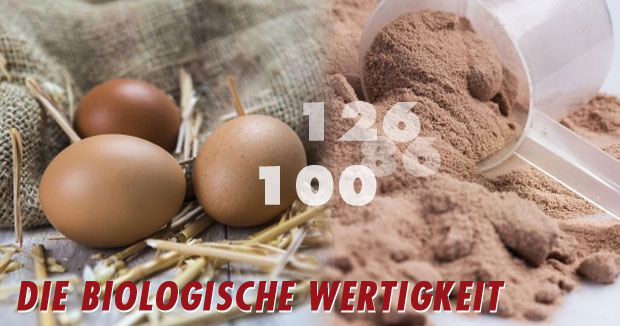Biological value - what exactly is it?

Protein powders are a common method for active athletes to support muscle building, muscle maintenance and, if necessary, to accelerate the build-up of mass, especially during weight training. However, it is not only the amount of protein that is decisive in order to achieve good results. The biological value of the protein powder also plays a very important and often underestimated role.
What is meant by biological value?
The biological value (BW) determines which effective requirement a protein powder can cover in the organism. The reference variable for determining the biological value of protein forms is the whole egg. A biological value of 100 was fixed for the whole egg. The rule is that the amino acid structure of the respective protein, the higher its biological value, the more similar it is to the amino acid structure of the body protein. Thus, with a high biological value, correspondingly less of the protein has to be added in order to achieve a protein balance or to implement a positive nitrogen balance or protein balance. These are important prerequisites for effective muscle building. For comparison: the whole egg has a biological value of 100, whey protein has a biological value of 105 and various protein mixtures as they are often used are found in protein powders, definitely have a biological value of 120 and are therefore more valuable for building muscle than the pure egg as a food.
Examples of the biological value of foods and types of protein
Overview of the calculated BW of some foods and proteins:
| Food / combination | Biological value |
|---|---|
| Whole egg 35%, potato 65% | 137 |
| Whole egg 70%, milk 30% | 124 |
| Volleyball 60%, Soy 40% | 122 |
| Beef 77%, potatoes 23% | 114 |
| Milk protein 40%, Wheat protein 30%, Soy protein 30% [1] | 120 – 126 |
| Milk protein 40%, Soy protein 40%, Egg protein 20% [1] | 118 – 124 |
| Whey Protein | 104 – 110 |
| Whole egg (reference value) | 100 |
| Beef (beef protein) | 92 |
| tuna | 92 |
| Cow's milk (casein protein) | 88 |
| Soja (Sojaprotein) | 84 – 86 |
| Travel (Reisprotein) | 81 |
| Potatoes | 76 |
| Beans | 72 |
| More | 72 |
| oats | 60 |
| Wheat (wheat protein) | 56 – 59 |
Those: Wikipedia as well as [1] manufacturer information of various protein powders.
Types of protein without a clear indication of their biological value: pea protein, hemp protein.
The mix does it
It is also pleasant that the higher the biological value of a protein source, less of this protein source has to be consumed in order to absorb the necessary daily amount of protein. This in turn is particularly important for athletes who have to control their food intake in order not to build up unnecessary fat reserves, but who can still absorb high amounts of protein from high-quality protein sources such as protein powder.
A combination of different foods with protein powder can significantly enhance the value of protein within the meal. In addition, one can improve the biological value through optimized nutrition and Dietary supplement with protein powder even better if you implement a favorable combination of foods. In general, for example, the protein requirement can be covered with protein from the whole protein by a minimum requirement of 0.5 g protein per kilogram of lean body mass. If the biological value of a meal increases, the required intake is reduced to 0.4 g per kg of lean body mass. This is the case if, for example, a combination of potatoes and whole egg is implemented in the meal, because this way the biological value of the meal with the whole egg can be increased to 137.
Optimal: a high-quality protein powder and the addition of animal protein sources
A protein powder that is combined from an optimal mix of protein sources and supplemented with animal protein sources in the meal is also beneficial for optimally supplying the athlete's body with plenty of protein. You should check the biological value of the protein powder before buying it. It should also be noted that the protein requirement in athletes increases slightly to up to 2 g protein per kilogram of body weight. Here, a supply of additional protein through food supplements is absolutely sensible to meet the increased need and thus optimize performance. Protein types such as Molken- bzw. Whey protein, Caseinprotein and Multi-component protein powder with a high biological value. These protein powders are also available in many different flavors, but also as tasteless or tasteless. neutral variant without further additions.




